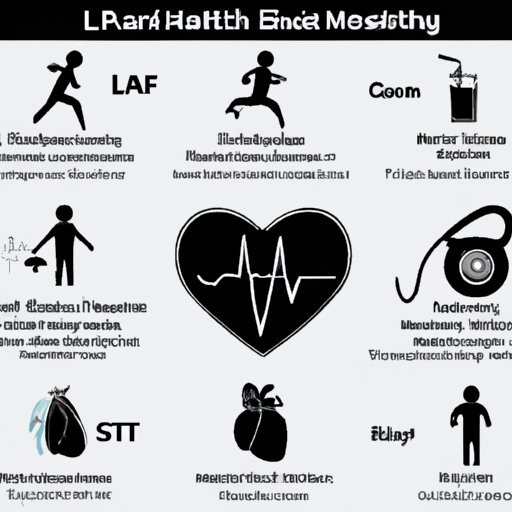Introduction
Heart health is essential to living a long and healthy life. Taking the time to learn about how to keep your heart healthy can help you live a longer and more fulfilling life. In this article, we’ll explore the steps you can take to ensure that your heart stays healthy and strong. We’ll look at exercise, diet, sleep, stress management, quitting smoking, and monitoring your blood pressure and cholesterol levels.
Exercise Regularly
Exercising regularly is one of the most important steps you can take to maintain a healthy heart. Regular physical activity can help reduce your risk of heart disease, stroke, and other cardiovascular diseases. Exercise also helps improve circulation, lowers bad cholesterol levels, and increases good cholesterol levels. It can also help combat depression, anxiety, and stress.
The American Heart Association recommends that adults get at least 150 minutes of moderate-intensity aerobic activity or 75 minutes of vigorous-intensity aerobic activity each week, in addition to muscle-strengthening activities at least twice a week. Examples of moderate-intensity aerobic activities include walking, jogging, swimming, dancing, and biking. Vigorous-intensity activities include running, jumping rope, and playing sports such as basketball or tennis.
Eat a Healthy Diet
Eating a healthy diet is another key factor in maintaining a healthy heart. Eating nutrient-dense foods can help reduce your risk of heart disease and stroke by keeping your cholesterol levels in check. It can also help lower your blood pressure and reduce inflammation in your body.
Some of the nutrients you should include in your diet are fiber, omega-3 fatty acids, protein, vitamins, minerals, and antioxidants. Foods rich in these nutrients include fruits, vegetables, whole grains, lean meats, fish, nuts, seeds, and legumes. It’s also important to limit foods high in sodium, saturated and trans fat, sugar, and refined carbohydrates.
Get Adequate Sleep
Getting enough sleep is essential for maintaining a healthy heart. Studies have shown that people who don’t get enough sleep are more likely to develop heart disease and stroke. Not getting enough sleep can also increase your risk of obesity, diabetes, and high blood pressure.
Adults should aim for seven to nine hours of sleep per night. To get better sleep, try limiting caffeine, avoiding screens before bed, exercising regularly, and establishing a consistent sleep routine.
Manage Stress
Stress can have a negative impact on your heart health. When stressed, your body releases hormones that increase your heart rate and blood pressure, which can strain your heart. Chronic stress can also lead to unhealthy habits such as overeating, smoking, and drinking alcohol.
To manage stress, it’s important to practice relaxation techniques such as deep breathing, yoga, meditation, and listening to music. You should also make time for activities you enjoy, such as reading, spending time with friends and family, and taking walks in nature.
Quit Smoking
If you smoke, quitting is one of the best things you can do for your heart health. Smoking increases your risk of heart attack, stroke, and other cardiovascular diseases. Quitting smoking can reduce your risk and help your body heal from the damage caused by smoking.
There are many resources available to help you quit smoking, including counseling, medications, and support groups. Your doctor can help you find the right resources to help you quit.
Monitor Your Blood Pressure and Cholesterol Levels
Monitoring your blood pressure and cholesterol levels is important for maintaining a healthy heart. High blood pressure and high cholesterol can put you at risk for heart attack and stroke. Your doctor can help you determine what your ideal numbers should be and how often you should have them checked.
You can also monitor your blood pressure and cholesterol levels at home using an at-home device. These devices are easy to use and can provide accurate results in just a few minutes.
Conclusion
Maintaining a healthy heart is essential for living a long and healthy life. By following the steps outlined in this article, you can take control of your heart health and reduce your risk of heart disease and stroke. Regular exercise, eating a healthy diet, getting enough sleep, managing stress, quitting smoking, and monitoring your blood pressure and cholesterol levels are all important steps to take to ensure a healthy heart.
(Note: Is this article not meeting your expectations? Do you have knowledge or insights to share? Unlock new opportunities and expand your reach by joining our authors team. Click Registration to join us and share your expertise with our readers.)
